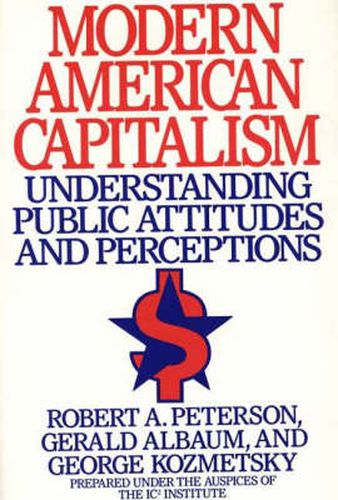Readings Newsletter
Become a Readings Member to make your shopping experience even easier.
Sign in or sign up for free!
You’re not far away from qualifying for FREE standard shipping within Australia
You’ve qualified for FREE standard shipping within Australia
The cart is loading…






In this work, the authors have systematically and formally documented the American public’s understanding of, attitudes toward, and perceptions regarding capitalism in the 1980s, and in so doing, they focus expressly on capitalism through empirical survey research. This work is based on a decade of empirical investigations and attempts to provide an accurate perspective that is devoid of the authors’ personal views. The data for the studies reported in the book were derived from questionnaires administered to more than 10,000 individuals - comprising national samples of the general public, newspaper editors and college students. Information was collected by telephone or mail interviews, and participants were queried about various facets of capitalism. In analyzing the data, the authors have integrated disparate research to provide a comprehensive portrait of the public’s view of capitalism at the beginning and the end of the 1980s. Following an introductory chapter, the presentation of their findings falls into four primary subject areas: defining capitalism, attitudes toward capitalism, perceptions of capitalism and business and changes in attitudes toward capitalism. A final chapter summarizes the conclusions. In identifying a heretofore unknown public mind-set, this study should be a valuable reference tool for courses and professionals in corporate communications, management and business and government, as well as a useful addition to public and academic libraries.
$9.00 standard shipping within Australia
FREE standard shipping within Australia for orders over $100.00
Express & International shipping calculated at checkout
In this work, the authors have systematically and formally documented the American public’s understanding of, attitudes toward, and perceptions regarding capitalism in the 1980s, and in so doing, they focus expressly on capitalism through empirical survey research. This work is based on a decade of empirical investigations and attempts to provide an accurate perspective that is devoid of the authors’ personal views. The data for the studies reported in the book were derived from questionnaires administered to more than 10,000 individuals - comprising national samples of the general public, newspaper editors and college students. Information was collected by telephone or mail interviews, and participants were queried about various facets of capitalism. In analyzing the data, the authors have integrated disparate research to provide a comprehensive portrait of the public’s view of capitalism at the beginning and the end of the 1980s. Following an introductory chapter, the presentation of their findings falls into four primary subject areas: defining capitalism, attitudes toward capitalism, perceptions of capitalism and business and changes in attitudes toward capitalism. A final chapter summarizes the conclusions. In identifying a heretofore unknown public mind-set, this study should be a valuable reference tool for courses and professionals in corporate communications, management and business and government, as well as a useful addition to public and academic libraries.